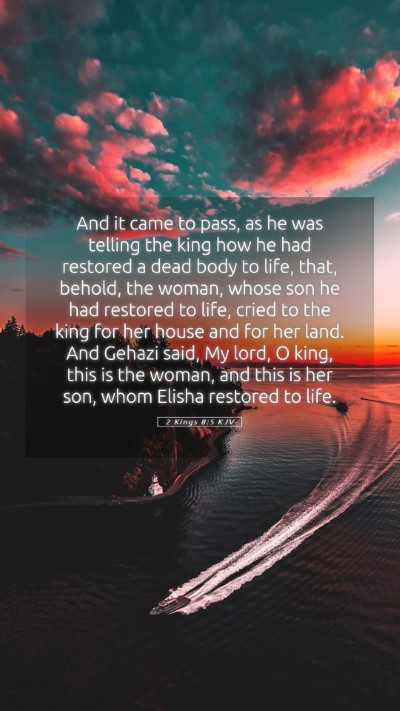Bible Verse Commentary: 2 Kings 8:5
Verse Text: "And it came to pass, as he was telling the king how he had restored a dead body to life, that, behold, the woman whose son he had restored to life cried to the king for her house and for her land." (2 Kings 8:5, KJV)
Understanding the Context of 2 Kings 8:5
This verse is situated in a narrative concerning the prophet Elisha and his miracles. The story illustrates not only the miraculous powers granted to Elisha but also reveals significant interactions between the divine and human realms, showcasing God’s attentiveness to the needs of His people.
Insights from Commentaries
- Matthew Henry: Henry emphasizes the miraculous nature of Elisha's works, pointing out that this specific miracle of bringing a child back to life illustrates God's power over death. The event described is not merely an act of compassion but serves to strengthen the faith of those witnessing it.
- Albert Barnes: Barnes highlights the significance of the woman's plea to the king. He interprets her return as an act of faith and acknowledgment of Elisha's power, showing how God uses human intermediaries to fulfill His purposes. The encounter with the king symbolizes the importance of proper recompense, illustrating divine justice in earthly affairs.
- Adam Clarke: Clarke notes that this passage showcases the relationship between divine intervention and the human experience of loss and justice. He suggests that the woman’s appeal for her land is a poignant reminder of the struggles faced by people during times of loss and shows God’s care in restoring what was taken from them.
Thematic Connections
This passage touches on several enduring themes in Scripture, including:
- Divine Restoration: The narrative portrays how God restores life and brings back what is lost, resonating with the hopes of believers for redemption and renewal.
- Faith in Action: The woman’s request to the king illustrates the importance of approaching authority with faith, trusting that God will work through leaders to meet the needs of His people.
- God's Sovereignty: The events demonstrate God’s overarching control, guiding circumstances to ensure justice and support for those who honor Him.
Cross References
Related scripture for further study:
- 2 Kings 4:32-37 - The account of Elisha raising the Shunammite's son.
- Luke 7:11-17 - Jesus raises the son of the widow of Nain, reflecting similar miraculous themes.
- Hebrews 11:35 - Reference to those who received their dead raised to life again, illustrating faith and miracles.
Conclusion
In examining 2 Kings 8:5, one gains a rich understanding of how God operates within the lives of the faithful through historical narratives and miraculous works. The story not only showcases the peculiarity of God's involvement in restoring life but also emphasizes the believer's response to divine aid. Through Elisha's actions and the woman's steadfast appeal, we find insights that remain relevant for our lives today. Believers are reminded to approach their circumstances with faith, knowing that God sees their needs and can restore what is lost.
For Further Exploration
For those interested in deepening their biblical understanding, consider joining Bible study groups or utilizing various online Bible study tools. Resources can include Bible study guides focusing on similar themes, or lessons that encourage Bible study insights through scripture analysis.
Keywords Summary
- Bible verse meanings
- Bible verse interpretations
- Bible verse commentary
- Scripture analysis
- Biblical exegesis
- Understanding Scripture
- How to interpret Bible verses


